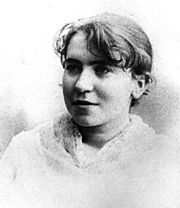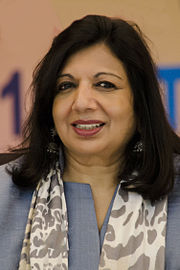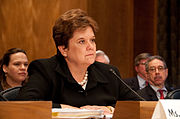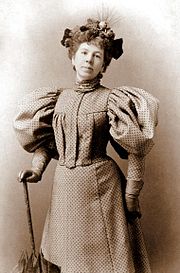Mujeres y diversidad de género en Wikimedia
Este mes reconoce a las mujeres alrededor del mundo. En honor del Día Internacional de la Mujer y la nueva Campaña de Inspiración de la Fundación Wikimedia, estamos dando notoriedad a mujeres destacadas y temas de género este mes en el blog de Wikimedia.

Can you help find high-quality articles that celebrate women and gender diversity on Wikipedia and sister sites?
¿Cuáles son tus artículos de Wikipedia de alta calidad favoritos, sobre mujeres destacadas? ¿Cuales son tus artículos de alta calidad sobre diversidad de género?
Estamos buscando artículos factuales, bien escritos y realmente profundos de la Wikipedia de tú elección. No se considerarán artículos que no cumplan con este criterio.
Por favor añade tus sugerencias a continuación. Asegúrate de incluir un enlace a tu favorito, y una frase de porqué lo incluiste (por ejemplo, ¿qué has aprendido de este artículo?)
También invitamos a que agregues tu + 1 en los artículos que considera que están más enriquecidos, para ayudar a seleccionar nuestras mejores opciones para nuestro informe a finales de este mes.
Por favor coloca aquí tus recomendaciones antes del 15 de marzo de 2015. Después prepararemos un reporte acerca de nuestros favoritos, y los publicaremos en el blog de Wikimedia la siguiente semana.
Gracias por ayudar a destacar contenido de calidad en este tópico importante.
El equipo de comunicaciones de la Fundación Wikimedia.
Biographies
Please recommend high-quality biographical articles about notable women, from the wiki of your choice. Or add your +1 for good articles that inspire you.
- Suggested by: Fabrice Florin (WMF)
- Why I recommend it: Ada Lovelace wrote what is recognized as the first algorithm intended to be carried out by a machine. Because of this, she is often described as the world's first computer programmer. This article is factual and well-written; it features a woman that's an inspiration to many people, particularly in the technology community.
- +1: (sign here if you like it)
- Suggested by: Fabrice Florin (WMF)
- Why I recommend it: Malala Yousafzai is the youngest-ever Nobel Prize laureate. She is known for human rights advocacy for education and for women in northwest Pakistan, where she faced abuse from the local Taliban. Her advocacy has since grown into an international movement. This article is informative, in-depth and well-researched; it's about an inspiring young woman that's shown exceptional courage and started an international movement.
- +1: (sign here if you like it)
- Kaldari (talk) 01:26, 5 March 2015 (UTC)
- Marianne Kettysdatter Klug 10:15pm, 5 March 2015 (UTC)
- Suggested by: Fabrice Florin (WMF)
- Why I recommend it: Hillary Clinton is an influential figure in American politics, having served as Secretary of State, U.S. Senator, First Lady -- and as a leading candidate for the U.S. presidency. She is an advocate of "smart power" that combines diplomacy with military power, and has encouraged empowerment of women everywhere. I found this article factual, fair and thorough.
- +1: (sign here if you like it)
- Suggested by: VGrigas (WMF) (talk) 18:49, 4 March 2015 (UTC)
- Why I recommend it: I've admired her influence at a time when women weren't allowed to hold political office. I also love her quotes.
- +1: (sign here if you like it)
- Suggested by: Kaldari
- Why I recommend it: Featured article. "The most dangerous woman in America."
- +1: (sign here if you like it)
- VGrigas (WMF) (talk) 19:18, 20 March 2015 (UTC)
- Duckduckstop (talk) 00:44, 22 March 2015 (UTC)
- Suggested by: Katherine (WMF) (talk) 07:51, 5 March 2015 (UTC)
- Why I recommend it: Lamarr is known primarily as an actress, despite being instrumental in making WiFi, Bluetooth, and CDMA mobile telephony possible -- all in the name of defeating the Nazi war effort.
- +1: (sign here if you like it)
- Suggested by: Katherine (WMF) (talk) 07:51, 5 March 2015 (UTC)
- Why I recommend it: As the world re-urbanizes, we have Jane Jacobs to thank for the preservation of walkable, community-oriented urban planning (especially in the U.S.) Jacobs mobilized New York City against the urban planning policies of brutalist utilitarian Robert Moses, preserving the city's iconic neighborhoods. She had real flaws, but her work was undeniably prescient.
- +1: (sign here if you like it)
- Suggested by: Katherine (WMF) (talk) 07:59, 5 March 2015 (UTC)
- Why I recommend it: Ginsburg is a member of the Supreme Court of the United States, the second female judge ever appointed, and the first Jewish female judge in the court's history. She is also 81 years old, and has a healthy sense of her own vitality and influence.
- +1: Jane023 (talk) 07:56, 22 March 2015 (UTC)
- +1: (sign here if you like it)
- Suggested by: Katherine (WMF) (talk) 07:58, 5 March 2015 (UTC)
- Why I recommend it: Pillay is a South African human rights lawyer who most recently served as the United Nations High Commissioner for Human Rights. She defended anti-apartheid activists while breaking color and gender barriers as a jurist in South Africa, before becoming a respected international human rights jurist.
- +1: Mary Mark Ockerbloom (talk) 16:12, 28 March 2015 (UTC)
- VGrigas (WMF) (talk) 19:19, 20 March 2015 (UTC)
- Suggested by: Andrew (WMF)
- Why I recommend it: Anne Frank is a very inspirational women who persevered, for a short time, while the odds where against her.
- +1: She's also gets the most page hits per month of any Dutch woman on the English Wikipedia, though she was born in Germany. Jane023 (talk) 07:56, 22 March 2015 (UTC)
- +1, Though she lived in Europe, Ann is very popular all over the globe. --Netha Hussain (talk) 20:35, 28 March 2015 (UTC)
- +1: (sign here if you like it)
For more ideas of articles to suggest, check out this list from WikiProject Women's History.
- Suggested by Duncan Hull
- Suggested by Duncan Hull
- Suggested by Duncan Hull
- Suggested by Duncan Hull
- Suggested by Duncan Hull
- Suggested by Duncan Hull
- Suggested by Duncan Hull
- Suggested by Duncan Hull
- Suggested by: --ProtoplasmaKid (WM-MX) (talk) 03:07, 6 March 2015 (UTC)
- Why I recommend it: Great content and edited by many editors, even being a featured article, is a content that can grow much more.
- +1: (sign here if you like it)
- Suggested by: jewel457
- Why I recommend it: She is the first female President in Asia. Prior to that, she has not held any elected position in government, she is said to be "the housewife that launched a revolution."
- +1: (sign here if you like it)
Patricia Locke (Tawacin WasteWin)
- Suggested by: Wiki-uk
- Why I recommend it: For her work in promoting, preserving and maintaining indigenous languages and cultures.
- I've added her photo, but I notice it is listed under a Non-free media information and use rationale, could it be used here?
- +1: (sign here if you like it)
- Suggested by: Keilana
- Why I recommend it: She was the queen of cytogenetics, and discovered several important concepts that make everything about modern molecular genetics possible. And of course, she was ignored by the scientific establishment for years. (But it all ends well – she got the Nobel Prize!)
- +1: (sign here if you like it)
- Fabrice Florin (WMF) (talk) 02:07, 28 March 2015 (UTC)
- To give you some idea, she discovered genetic recombination, crossing over and the purpose of telomeres and centromeres. Any reasonably advanced biology class will spend time on her discoveries. Hell, a high-school/GCSE biology class will at least cover some of them. Adam Cuerden (talk) 22:02, 9 July 2016 (UTC)
- Suggested by: Mohsindalvi18031987
- Why I recommend it: Rosalind Franklin was instrumental in deciphering the structure of DNA, which today is the cornerstone of modern medicine. In 1952, whilst at King's College, London, she and Raymond Gosling obtained exceptionally clear diffraction pictures of DNA (see Photo 51) and also discovered that there were two forms of DNA. It is alleged that sexism, workplace conflict and her aversion towards reaching to premature conclusions robbed her from sharing (posthumously) the 1962 Nobel Prize in Physiology or Medicine for decoding the structure of DNA alongwith James Watson, Francis Crick and Maurice Wilkins. In 1953, she joined Birkbeck College, London and by 1956, she and Donald Caspar decoded the structure of the tobacco mosaic virus, an RNA virus. Due to long exposure to X-rays, she developed ovarian tumors and died young at 37 years of age.
- Franklin was a chemist, X-ray crystallographer and experimenter par excellence, yet received no award or recognition in her lifetime. It is only recently that the scientific community has begun to notice and appreciate her work.
- +1: (sign here if you like it)
- Er Mohsin Dalvi
- Fabrice Florin (WMF) (talk) 23:00, 27 March 2015 (UTC) – Rosalind Franklin did much of the hard work to reveal the helical structure of DNA through X-Ray diffraction images -- enabling Jim Watson and Francis Crick to win a Nobel prize, based in part on her work. Many think she should have received more recognition for her invaluable contributions towards solving the mystery of how life reproduces itself.
- Also, The Double Helix really screwed her over. Adam Cuerden (talk) 22:03, 9 July 2016 (UTC)
- Suggested by: Mary Mark Ockerbloom
- Why I recommend it: Temporal diversity; Stunning poet and painter at a time when few women did either.
- +1: (sign here if you like it)
- Suggested by: Mary Mark Ockerbloom
- Why I recommend it: Cultural diversity; One of the Financial Times top 50 women in business; impressive success after being told that she would not be hired in a male-dominated field.
- +1: (sign here if you like it)
- Suggested by: Mary Mark Ockerbloom
- Why I recommend it: Amazing scientist; world authority on numerical methods for large-scale simulation of physical systems which are used by many other scientists to model everything from supernovae to schools of fish.
- +1: (sign here if you like it)
- Suggested by: Mary Mark Ockerbloom
- Why I recommend it: FA already, traveler, mountaineer, writer, supported women suffrage, comments on conditions for women internationally in her travel books
- +1: (sign here if you like it)
- this is a non-free use image, could it be used for this?
- Suggested by: Mary Mark Ockerbloom
- Why I recommend it: FA already, amazing Indigenous Australian artist
- +1: (sign here if you like it)
Your article thumbnail (180px)
- Suggested by: Tracy Hartford
- Why I recommend it: American psychologist known for working in gender studies.
- +1: (sign here if you like it)
- Suggested by: User:Glitchygirl
- Why I recommend it: Anita Sarkeesian is at the forefront of women's studies in popular culture. Her essays and video blogs have been used to teach university-level courses, amassed readers and viewers in the millions, and intend to create a renewed taste for originality and diversity in modern media. I think, although it is not a good or featured article (as I think it should be crafted into), it conveys that well.
- +1: (sign here if you like it)
- Suggested by: Wittylama (talk)
- Why I recommend it: Australia's first female electrical engineer, "Mrs Mac" had a fantastically interesting and trailblazing life, pushing all along the way to give greater access to technical education for women. Two days before she died she declared, "...it is finished, and I have proved to them all that women can be as good as, or better than men." I wrote this article using free-licensed biographies and brought it to GA class. It is the highest quality Wikipedia biography of a woman from Sydney or New South Wales (all higher quality biographies of Australian women are of sports/music stars).
- +1: (sign here if you like it)
- Suggested by: Jane023
- Susan Sontag made me think about photography and why I bother with it as a female Wikipedian.
- +1: (sign here if you like it)
- Suggested by: Brian Caton
- Why I recommend it: Write a sentence or two about why you picked this person and this biography. What did you learn from this article?
- +1: (sign here if you like it)
- Suggested by: Your name
- Why I recommend it: Write a sentence or two about why you picked this person and this biography. What did you learn from this article?
- +1: (sign here if you like it)
- Suggested by: Your name
- Why I recommend it: Write a sentence or two about why you picked this person and this biography. What did you learn from this article?
- +1: (sign here if you like it)
- Suggested by: John Cheek
- Why I recommend it: Write a sentence or two about why you picked this person and this biography. What did you learn from this article?
- +1: (sign here if you like it)
- Suggested by: Marco Mizrahi
- Why I recommend it: Write a sentence or two about why you picked this person and this biography. What did you learn from this article?
- +1: (sign here if you like it)
- Suggested by: Marco Mizrahi
- Why I recommend it: Write a sentence or two about why you picked this person and this biography. What did you learn from this article?
- +1: (sign here if you like it)
Your article title and link
Your article thumbnail (180px)
- Suggested by: Your name
- Why I recommend it: Write a sentence or two about why you picked this person and this biography. What did you learn from this article?
- +1: (sign here if you like it)
For more ideas of articles to suggest, check out this list from WikiProject Women's History.
Gender diversity
Please recommend high-quality articles about ideas, issues or movements related to gender diversity or gender equality, from the wiki of your choice. Or add your +1 for good articles that inspire you.
- Suggested by: Fabrice Florin (WMF)
- Why I recommend it: This article is informative, thorough and nuanced. It was helpful for me to learn about some of the different characteristics of gender, from biological sex to social roles and gender identity.
- +1: (sign here if you like it)
- Suggested by: Fabrice Florin (WMF)
- Why I recommend it: A good introduction to some of the movements and ideologies that seek to establish equal rights and opportunities for women in education and employment. The article seems factual, in-depth and well-sourced, with a lot of useful context about these important issues.
- +1: Mary Mark Ockerbloom (talk) 19:40, 28 March 2015 (UTC) (sign here if you like it)
Your article title and link
Your article thumbnail (180px)
- Suggested by: Your name
- Why I recommend it: Write a sentence or two about why you picked this person and this biography. What did you learn from this article?
- +1: (sign here if you like it)
For more ideas of articles to suggest, check out this list from WikiProject Women's History.
Did you know?
Please recommend insightful articles that reveal little-known facts about women and gender diversity, from the wiki of your choice. Or add your +1 for good articles that inspire you.
- Suggested by: Heather Walls (WMF)
- Why I recommend it: Because who doesn't want to learn about pirates?
- +1: (sign here if you like it)
Women in popular legends
File:Subte BsAs - Estación Bulnes (9).JPG
- Article: La Telesita
- Suggested by: María Cruz
- Why I recommend it: I picked this article because it got the place «Best article» in the First editing contest «Mujeres Iberoamericanas». I learned from it how important oral tradition is, and how to capture and document popular knowledge in an encyclopedic way.
- +1: (sign here if you like it)
- Suggested by: Marianne Kettysdatter Klug
- Why I recommend it: A gang of Indian women activists in India.
- +1: (sign here if you like it)
Your article title and link
Your article thumbnail (180px)
- Suggested by: Your name
- Why I recommend it: Write a sentence or two about why you picked this person and this biography. What did you learn from this article?
- +1: (sign here if you like it)
For more ideas of articles to suggest, check out this list from WikiProject Women's History.






























